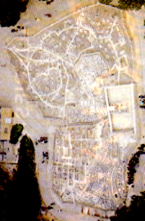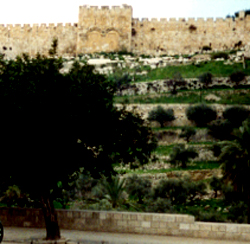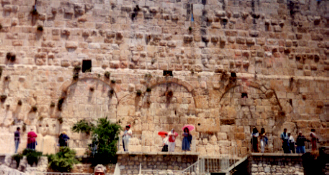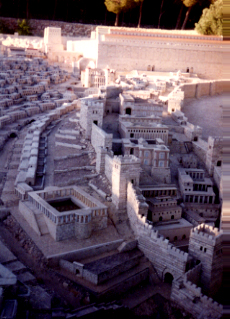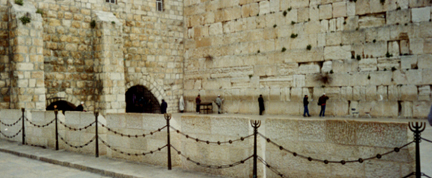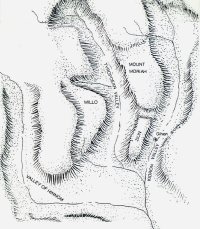Skip to comments.
Arafat Lies About His Birthplace
israelbehindthenews.com ^
| Aug-06-00
| Danny Rubenstein
Posted on 05/06/2002 9:06:38 AM PDT by thatcher
Arafat lies about his birthplace
Danny Rubenstein
Arab Affairs correspondent, HaAretz
http://israelbehindthenews.com/Aug-06-00.htm
What a difference a birthplace makes: How, contrary to the facts, was Arafat born in Jerusalem?
One of the pieces of information leaked to the Arabs at Camp David (to Muhammad el-Abzi of the international Al-Quds newspaper) stated that Prime Minister Ehud Barak suggested to Palestinian Authority Chairman Yasser Arafat that he set up his presidential offices in the village of Abu Dis, which is actually a suburb of East Jerusalem.
Abu Dis is even closer to the Old City and the Temple Mount than the Israeli Knesset building, and Barak allegedly said to Arafat that this would make it possible for him to pray every day at the Al Aqsa mosque.
To this Arafat purportedly replied, "My office will be in the Old City, on the property that is registered in my family's name, the Al-Qadwa family.".There seems to be some mistake in this statement, because there is no evidence that the Al-Qadwa family, which is Arafat's father's family, had any property in the Old City of Jerusalem.
The family that did have property there, and still does, is the Abu Sa'ud family, which is Arafat's mother's family. The large old house belonging to the Abu Sa'ud family tribe, which was among the oldest and most established Arab families in Jerusalem, stood on what is now the southern corner of the plaza in front of the Western Wall, adjacent to the Mugrabi Gate that leads from the plaza to the Al Aqsa mosque.
That house was destroyed in the summer of 1967 in accordance with a decision by the government of Israel to evacuate and demolish the whole Mugrabi neighborhood in order to expand the plaza at the foot of the Wall.
Arafat has claimed in the past that he was an eyewitness to the destruction of his mother's home. In the summer of 1967 he was still an unknown figure, and the Palestinian Liberation Organization sent him to infiltrate the West Bank via the Jordan river in order to set up a cell of guerillas to wage a grass roots war against the Israeli occupation. After spending a few weeks in the underground here, Arafat returned to east of the Jordan river, and that is apparently the last time he visited Jerusalem.
Arafat has, of course, enormous national, religious and political interest in Jerusalem, and it was the reason that the sides did not succeed in reaching an accord at Camp David. This interest, however, is coupled with a complex personal story. All the official PLO publications have always stated that Arafat was born in August 1929 in his family's home in East Jerusalem.
Several newspaper researchers have investigated this statement and found it to be untrue.
Arafat was born in Cairo. His father, Abd al Ra'uf Arafat Al-Qadwa, was the son of a well-known family from Gaza and nearby Khan-Yunis, who had married Zahava Abu-Sa'ud from Jerusalem. In 1927, the couple had emigrated from Palestine and settled in Egypt. Two years later their son Yasser was born. When Yasser was three years old, his mother died and his father sent him to spend some time with his mother's family in Jerusalem. During the 1930s, Yasser lived alternately in Jerusalem and in Gaza, and after his father remarried, his family sent him back to Cairo, where he spent the rest of his youth.
What is bad about this biography? Is something not correct? It seems that during Arafat's early years as a PLO activist, he found it a great drawback to have been born in Egypt, in a foreign country, and not in the Palestinian homeland.
His friends also found it strange. Many of the young Arabs who volunteered to serve the PLO immediately after the Six-Day War noted with astonishment that their leader, whom they were meeting for the first time, spoke Arabic with an Egyptian accent. Arabs from Middle Eastern countries can easily recognize the country of origin of any other Arab they meet by his accent - and here the man who claimed to be a warrior representing and leading the Palestinian people spoke with an Egyptian accent.
Could the solution to the hardship of the Palestinian people and the refugees be spearheaded by a man whose speech indicated that he was not a Palestinian and was apparently also not a refugee?
Not only this, but the issue of birthplace is also among the most important components of the Israeli-Palestinian dispute. There is hardly a discussion in which the Palestinian claim of birthright is not raised - they were born here, this is their homeland, and they therefore deserve sovereignty over it. This counters the Jewish claim to the land, inasmuch as the Jews are foreigners, most of whom were born abroad and immigrated here.
And what could Arafat say to all this, when he, too, was born abroad? Furthermore, his father and mother left their homeland of their own free will. They were not expelled by a hostile imperialistic government and were not refugees displaced by a wave of Jewish settlers who stole their land, but they had simply picked up and gone down to Egypt because they felt they could earn a lot of money there (Arafat's father apparently emigrated to Egypt to claim ownership of a plot of land in Cairo that had belonged to his grandmother). How credible could all the Palestinian claims to standing firm on their ownership of their homeland be if the father of the national leader deserted the homeland to chase after riches?
Arafat was aware of all this. He understood that it would be better for whoever wanted to lead the Palestinian nationalistic struggle if his biography stated that he was born in Palestine, and there is no better birthplace than the Old City of Jerusalem, in a house adjacent to the Al Aqsa mosque.
It was easy for Arafat to say that he was born in Jerusalem because he was familiar with his grandparents' home from his childhood. When, several years ago, journalists showed him copies of his birth certificate and other documents attesting to his birth in Egypt, he replied that they were forgeries made by his father so that he would be exempt from paying tuition, as are all Egyptian residents who were born in Egypt. Arafat said that his mother came back from Cairo to Jerusalem to give birth to him in the family home, adding that he spent most of his childhood in Jerusalem and only went to Cairo when he had almost finished elementary school. On several occasions Arafat related his blurred memories as a child in the Old City, near the Wall, when there were clashes between Jews and Arabs during the pogroms (or the Arab rebellion, as they call it) of 1936 to 1939.
In interviews during the 1980s and 1990s, Arafat gave detailed accounts of the years he spent in the Abu-Sa'ud family home in Jerusalem, and spoke very little of the Al-Qadwa family home in Gaza, or about his youth and freedom in Cairo.
There are very few members of the Abu-Sa'ud family tribe still living in Jerusalem. Arafat's closest relatives there are some first cousins, the descendents of his mother's brothers and sisters. One of them, the engineer Ahmed Al Husseini who died recently, was the head of the East Jerusalem Electric Company. The family still owns a house and a plot of land in Ras el Amud, above the village of Silwan, next to the section of land that was purchased by philanthropist and settlement supporter Irving Moskowitz, on which a small Jewish neighborhood is now being built.
The place on which the original family home stood, below the Mugrabi Gate, currently serves Jewish worshipers at the Western Wall plaza. Even if a permanent accord grants Arafat presidential office space in the Old City, it is highly unlikely that it would be on the spot where his grandparents' home once stood.
TOPICS: Culture/Society; Extended News; Foreign Affairs; Israel
KEYWORDS: abudis; arafat; bethphage; biography; cairo; mugrabigate; westernwallplaza
[Bethphage (Beth Pagi), the "House of Unripe Figs" was considered the easternmost part of Jerusalem. Here is where the Sanhedrin sat as "elders sitting in the gate of the city." The main seat of the Sanhedrin was in the Temple but certain things could only be determined when they were at Bethphage, outside the walls of Jerusalem (Pesachim 63b): measurements involving finding a dead body, deciding what was pure or defiled/what could enter the city and what could not, death sentences for rebellious leaders, setting limits on the size of the city, the Temple, censuses and from here is where fire signals were sent out to show when the new months started and to keep track of the sacred calendar, etc. This was a very important place in the days of Jesus and would be the most appropriate place to keep the donkey. This way, he would be starting at the easternmost limit of Jerusalem and riding in through the Eastern Gate of Jerusalem proper. This is also the direction that the Jew's believe their Messiah will travel when he comes, that he will enter through the Eastern Gate.]
"I was glad when they said to me,
'Let us go into the House of Yahweh!'
Our feet shall stand within thy gates, O Jerusalem!
Jerusalem is built as a city compacted together
[where earth and heaven meet],
to which the tribes go up, the tribes of Yahweh,
unto the testimnony of Israel,
to give thanks to the Name of Yahweh.
For there are set thrones of judgment
--thrones of the House of David.
Pray for the Peace of Jerusalem! They who love thee will prosper."
Psalm 122:1-6 |
An overview of the city in Yahshua's day
The Temple complex is the large white rectangle. South of there is the original city of David. Westward expansion came next, then northward to its zenith right before the Romans destroyed the Temple in A.D. 70. |
|
The Temple Mount
Note that the eastern gate (at lower left) led directly into the sanctuary through a series of gates and courtyards. |
|
The Eastern Gate
...walled up by a Muslim ruler who thought he could prevent the return of the Messiah. But it holds an amazing parallel with the Garden of Eden, whose eastern entrance was also closed off. The most straightforward path into Yahweh's presence (symbolized by the Temple) is closed because of sin. But there is another way in... |
|
The Triple Gates
By Yahshua's day most pilgrims entered the Temple here. After a ritual washing outside, they had to go through a long tunnel, across a wide courtyard, and only then reached the real starting point! We can re-enter Yahweh's presence, but only by repentance, Yahshua's blood, and the Torah, which teaches us how to again be innocent as Adam was before he fell. And only then can we BEGIN to choose to be righteous!
|
|
The city of David with the Temple above
This view of a model at the Holy Land Hotel shows the southern wall. The set of gates at right were where the triple gates shown above are now. The bright white section around the corner shows where the Western (Wailing) Wall is. |
|
The Western Wall
Now an outdoor synagogue, the closest "house of prayer" to where the Holy of Holies once sat and will again sit. |
|
"The Place Where I have Set My Name"
Here is one aspect of this promise to Moses of where the Temple would be established: the valleys around Jerusalem form the Hebrew letter "Shiin", which is often used as an abbreviation for one of YHWH's names, "Shaddai", such as on a doorpost mezuzzah.
|
|
|
|
"If I forget you, O Yerushalayim, may my right hand forget [its skill]!"
Title: THE Donkey
Submitted by: research-bpr@philologos.org (Moza)
Date: January, 2002
URL: http://philologos.org/bpr/files/d004.htmTHE Donkey
17 Shevat, 5762
January 30, 2002
So Moses took his wife and sons, mounted them on the donkey, and returned to the land of Egypt... (Exodus 4:20, Stone Chumash)
In Hebrew, the definite article
ha,
the, in the passage above indicates that there is something special about this donkey. According to Rashi, this is the same donkey that Abraham saddled at the binding of Isaac (Gen 22:3), and the same one which the Messiah will use to reveal himself as stated in Zechariah 9:9 (Pirkei d'Rabbi Eliezer 31):
Rejoice greatly, O daughter of Zion; shout, O daughter of Jerusalem: behold, thy King cometh unto thee: he is just, and having salvation; lowly, and riding upon an ass, and upon a colt the foal of an ass. (KJV)
Messiah Jesus rode into Jerusalem on a special donkey. I say special because this animal wasn't with Jesus or his disciples but was tethered in Bethphage, a little village on the Mount of Olives:
Matthew 21:1 And when they drew nigh unto Jerusalem, and were come to Bethphage, unto the mount of Olives, then sent Jesus two disciples, 2 Saying unto them, Go into the village over against you, and straightway ye shall find an ass tied, and a colt with her: loose them, and bring them unto me. 3 And if any man say ought unto you, ye shall say, The Lord hath need of them; and straightway he will send them. 4 All this was done, that it might be fulfilled which was spoken by the prophet, saying, 5 Tell ye the daughter of Sion, Behold, thy King cometh unto thee, meek, and sitting upon an ass, and a colt the foal of an ass.
They find the donkey just where Jesus said it would be and then another unusual event takes place when they are not hindered from taking the animal, again, just as Jesus foretold:
Luke 19:32 And they that were sent went their way, and found even as he had said unto them. 33 And as they were loosing the colt, the owners thereof said unto them, Why loose ye the colt? 34 And they said, The Lord hath need of him. 35 And they brought him to Jesus: and they cast their garments upon the colt, and they set Jesus thereon.
I think this donkey belonged to Jesus and is the self-same one the Sages speak of. The owners were the ones Jesus had put in charge of watching over it (angels?) and when they heard that the true owner needed it they didn't intervene. I come to this conclusion by looking at the words "owners" and "Lord" in verses 33 and 34. They are both the same Greek word,
kurioV kurios, and 667 times in the KJV it is rendered Lord, 54 lord, 11 master etc. and its definition either denotes the particular person of God, the messiah or someone who is the possessor/has authority to dispose of something. Taking this into account the two verses above could read: "And as they were loosing the colt, the ones in charge of looking after it said unto them, Why loose ye the colt? And they said, the Messiah Jesus Christ hath need of his animal." If this donkey did not belong to Jesus then it seems strange that these men who were watching it didn't challenge the disciples further.
Jesus usually walked wherever he went but when he was in need of a donkey he knew exactly where to find one and this particular animal was used for his triumphal entry into Jerusalem. This was the time for the Jewish leaders to come and confirm that he was their awaited Messiah, to acknowledge the fulfillment of Zechariah 9:9 and to usher him in as their King. Unfortunately, the hour passed in spiritual blindness on the most part for all of Israel.
You may dismiss the whole notion of the same donkey carrying Abraham, Moses and the Messiah but if you believe what the Sages say and that Jesus' donkey might be the one, here are a few more things to consider. Why does Jesus house the animal in Bethphage? Why doesn't one of the disciples have care of it? Why doesn't he ride it more often? We come back to the same conclusion we had at the beginning of this discourse—this animal was somehow special.
Let's take a look at Bethphage. The Encyclopaedia Judaica states:
BETHPHAGE, village on the Mount of Olives in the immediate vicinity of Jerusalem; it is named for green figs (paggim). In ancient times, it was surrounded by a wall. Bethphage marked the eastern confines of Jerusalem in the Second Temple period (Men. 11:2; Men. 75b). In the New Testament (Matt. 21:1; Mark 11:1) it is mentioned as the place where Jesus found the she-ass on which he entered Jerusalem.
Bethphage (Beth Pagi), the "House of Unripe Figs" was considered the easternmost part of Jerusalem. Here is where the Sanhedrin sat as "elders sitting in the gate of the city." The main seat of the Sanhedrin was in the Temple but certain things could only be determined when they were at Bethphage, outside the walls of Jerusalem (Pesachim 63b): measurements involving finding a dead body, deciding what was pure or defiled/what could enter the city and what could not, death sentences for rebellious leaders, setting limits on the size of the city, the Temple, censuses and from here is where fire signals were sent out to show when the new months started and to keep track of the sacred calendar, etc. This was a very important place in the days of Jesus and would be the most appropriate place to keep the donkey. This way, he would be starting at the easternmost limit of Jerusalem and riding in through the Eastern Gate of Jerusalem proper. This is also the direction that the Jew's believe their Messiah will travel when he comes, that he will enter through the Eastern Gate.
I'm going to throw this in here but I don't know how it's explained by the Sages although it makes perfect sense to Christians who have read the book of Revelation (1:7). Why do they speak of him coming in the clouds for Zechariah 9:9 states he will come on an ass, denoting that they don't merit his coming? Are they talking of two separate comings here?
... if they are meritorious, [he will come] with the clouds of heaven; if not, lowly and riding upon an ass. (Sanhedrin 98a)
Messiah is to enter Jerusalem from the east riding a donkey. How is he to be recognized? Apparently the only criteria that is insisted upon is that the Messiah restore the kingdom (for Jesus fulfilled 99% of everything else that the Messiah was to do but they just were interested in that one aspect that wasn't fulfilled at his first coming?). Where is Abraham/Moses' donkey located? Probably at the gates of the city ready for the Messiah whenever he comes. Where are the gates of the city today? One of the scariest bits of information I found while studying this whole subject was that my Hastings' Dictionary stated that modern-day Bethphage is considered equivalent to Abu Dis. Abu Dis!! When Messiah comes the first thing he's going to have to do is to pass Yasser Arafat in his PLO headquarters at Abu Dis (for it is purported to have at least one angle of the building specifically in Jerusalem proper so that Arafat can state that it is officially Jerusalem, the capital of Palestine so it's right at the edge of the city limits). Arafat and his henchmen are the elders sitting at the eastern gate to the holy city and as of this writing, Israel is even considering repartitioning Jerusalem (deciding new measurements for the city in Bethphage?) that would divide Eastern and Western Jerusalem even further. There's no way for the Messiah to come in through the Eastern gate without walking through Palestinian controlled territory and what this would do in terms of defilement is something I don't even want to dwell on.
I do, however, want to bring this study back to Jesus and specifically Jacob's prophecy regarding his son Judah (seeing Jesus is a Judahite) in "the last days" (Gen 49:1):
The sceptre shall not depart from Judah, nor a lawgiver from between his feet, until Shiloh come; and unto him shall the gathering of the people be. He [Judah] will tie his donkey to the vine; to the vine branch his donkey's foal; he will launder his garments in wine and his robe in the blood of grapes. (Genesis 49:10,11, Stone Chumash)
Jesus rules now and forever and at his first and second coming he gathers all of God's people into closer relationship with the Father. At his triumphal entry into the holy city Jerusalem he rode Abraham and Moses' donkey (did Mary also have use of that animal?) conveying his identification with Israel and God's Torah, the root of the true vine whose dead branches were cut away to make room for new growth. Because of him we can all wash our garments in his blood and be pure and undefiled as we approach the King. He did it all and there is no other beside him.
Blessed are you, O Lord, our God, King of the Universe who has sent his son Jesus the Anointed whose blood is the perfect means of cleansing us from all our sins. Without him we die, with him we live forever in your presence. Open our eyes to all truth and may each branch prove ever more fruitful whether it be the original stock or those grafted in.
1
posted on
05/06/2002 9:06:39 AM PDT
by
thatcher
Disclaimer:
Opinions posted on Free Republic are those of the individual
posters and do not necessarily represent the opinion of Free Republic or its
management. All materials posted herein are protected by copyright law and the
exemption for fair use of copyrighted works.
FreeRepublic.com is powered by software copyright 2000-2008 John Robinson
